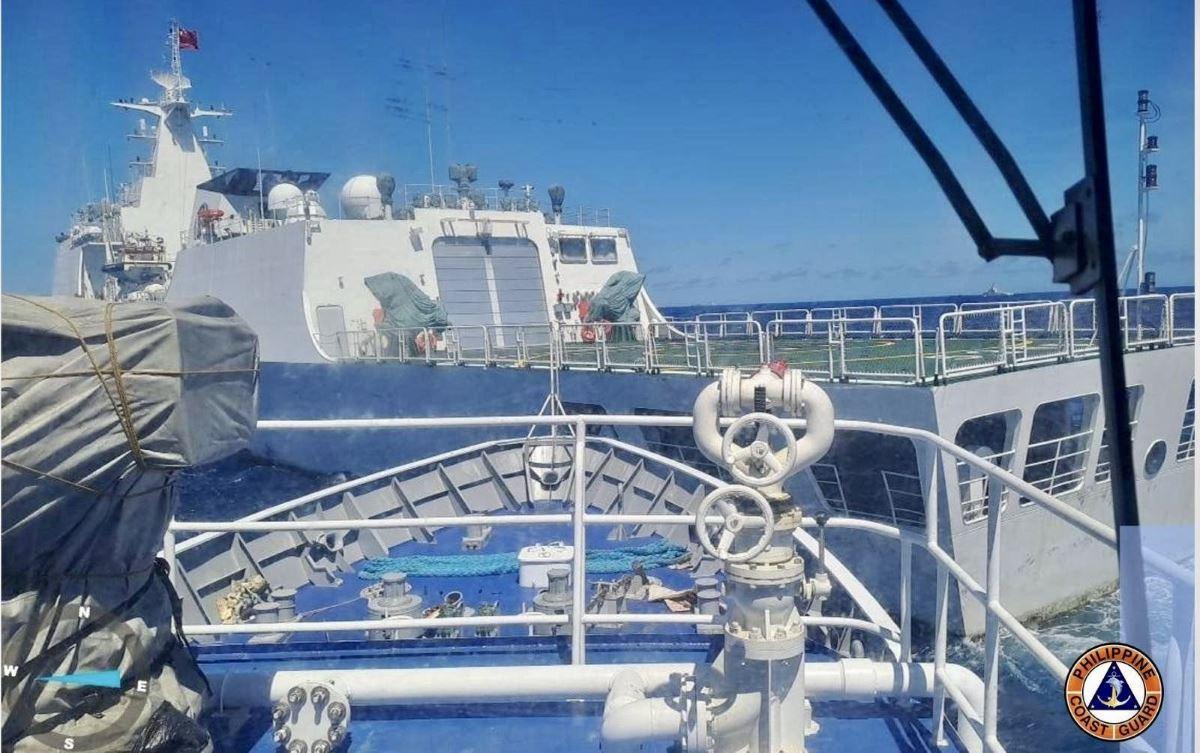US says China Coast Guard's water cannon attack vs. PCG threatens regional peace, stability

????????????????????: Barko ng China Coast Guard, binomba ng tubig ang sasakyang pandagat ng Pilipinas na papunta ng Ayungin Shoal para magsagawa ng resupply mission sa BRP Sierra Madre. | via @nimfaravelo
— DZBB Super Radyo (@dzbb) August 6, 2023
Video shared by: Senate President Juan Miguel Zubiri pic.twitter.com/LEcOQ9VNtz
The United States has backed the Philippines over the latest attack of the China Coast Guard (CCG) against the vessels of the Philippine Coast Guard (PCG) en route to Ayungin Shoal for a resupply mission, saying that it directly threatens the peace and stability in the region.
The US Department of State said that the People’s Republic of China’s (PRC) firing of water cannons and employing unsafe blocking maneuvers against PCG vessels on Saturday “interfered with the Philippines’ lawful exercise of high seas freedom of navigation and jeopardized the safety of the Philippine vessels and crew.”
“Such actions by the PRC are inconsistent with international law and are the latest in repeated threats to the status quo in the South China Sea, directly threatening regional peace and stability. By impeding necessary provisions from reaching the Filipino service members stationed at Second Thomas Shoal, the PRC has also undertaken unwarranted interference in lawful Philippine maritime operations,” US said in a statement.
The PCG on Sunday condemned CCG’s “dangerous maneuvers and illegal use of water cannons” against their vessels escorting the indigenous boats chartered by the Armed Forces of the Philippines (AFP) to deliver food, water, fuel, and other supplies to military troops stationed on BRP Sierra Madre in the Ayungin Shoal.
The AFP also condemned and expressed concern about the incident, which it called “excessive and offensive.”
Ayungin Shoal is part of the Kalayaan Island Group, which is an integral part of the Philippines, as well as the Philippines’ exclusive economic zone and continental shelf, over which the Philippines has sovereignty, sovereign rights and jurisdiction.
Citing the 2016 arbitration ruling, the US stressed that China “has no lawful claim to the maritime area around Second Thomas Shoal, which is located well within the Philippines’ exclusive economic zone.”
“The United States reiterates, pursuant to the 1982 Law of the Sea Convention, the arbitral decision is final and legally binding on the PRC and the Philippines. The United States calls upon the PRC to abide by the arbitral ruling as well as to respect the freedom of navigation – a right to which all states are entitled,” it added.
The US also reaffirmed that an armed attack on Philippine public vessels, aircraft, and armed forces would invoke mutual defense commitments under Article IV of the 1951 Mutual Defense Treaty of the Philippines and US.
Reactions
Australia joined the US in expressing deep concern over China's aggressive action against Philippine resupply vessels en route to Ayungjn Shoal.
Australian Ambassador H.K. Yu called the acts directed against the Philippines "dangerous and destabilizing."
"We reiterate our call for peace, stability, and respect for UNCLOS in the South China Sea - a vital international waterway," Yu said in a post on Twitter on Sunday.
UNCLOS stands for the United Nations Convention on the Law of the Sea, which extends the territorial jurisdiction of maritime states up to 200 nautical miles from its coasts. It is signed by at least 162 nations including Philippines and China.
Japanese Ambassador Koshikawa Kazuhiko, for his part, said the Chinese Coast Guard's actions were "unacceptable" and "infringes on lawful activities of the sea and endangers... navigational safety."
He added that Japan strongly supports the Philippine position in upholding maritime order based on UNCLOS and the 2016 Arbitral Award by the Permanent Court of Arbitration in The Hague, invalidating China's massive claim over the resource-rich waters.
The Canadian Embassy, meanwhile, condemned the "dangerous and provocative actions taken by the Chinese Coast Guard against Philippine vessels."
The embassy added that unsafe maneuvers and use of water cannons to disrupt the lawful operations of Philippine vessels was unacceptable, and inconsistent with the obligations of the People’s Republic of China (PRC) under international law.
"Continuing acts of intimidation and coercion by the PRC against its neighbors undermine safety, security and stability across the region, and raise the risks of grave miscalculation," said Canada in its statement.
"Canada reiterates its support for international law, including the 2016 arbitral decision on the South China Sea, which is final and binding, and calls on the PRC to comply with its obligations under international law."
European Ambassador to the Philippines Luc Véron said in a Twitter post that the they were very concerned about dangerous actions in South China Sea, and that EU stood with the Philippines in upholding the rules-based international order.
"The EU supports the legally binding nature of the 2016 South China Sea arbitration," added Véron.
GMA News Online has contacted the China Embassy for a statement but it has yet to receive a reply.
The Philippine government sued China before an international arbitral tribunal in The Hague in 2013. It ruled in favor of the Philippines in July 2016 when it junked China's nine-dash claim over the South China Sea.
China, however, rejected the Philippines' call to comply with the 2016 arbitration ruling, calling the decision "illegal and invalid.” —with a report from Michaela del Callar/KG, GMA Integrated News




